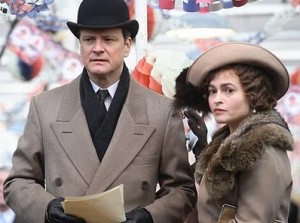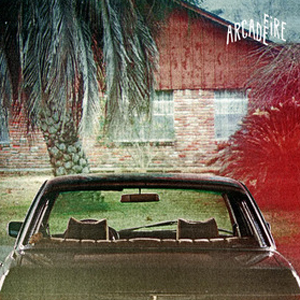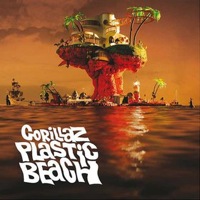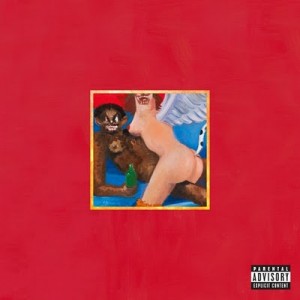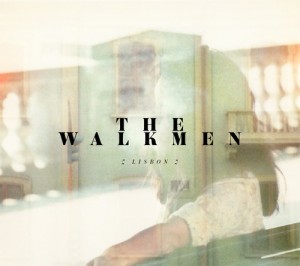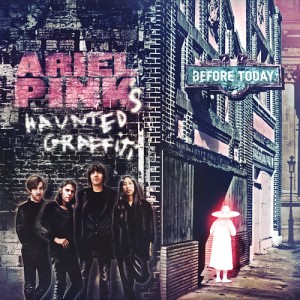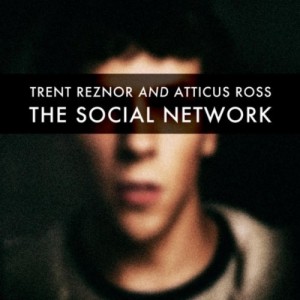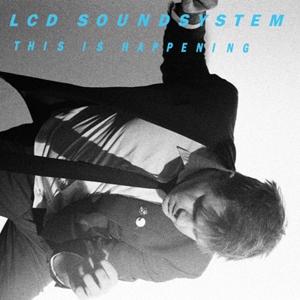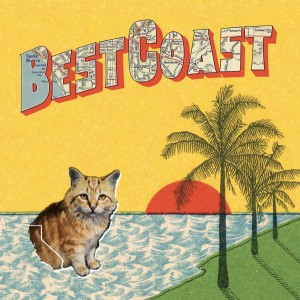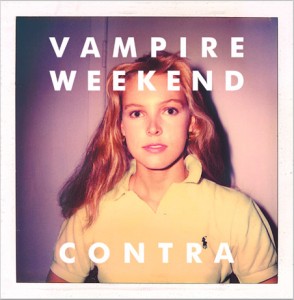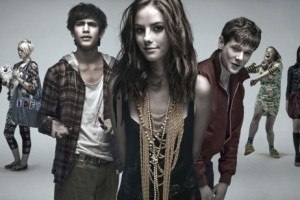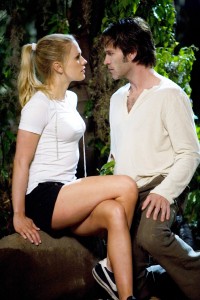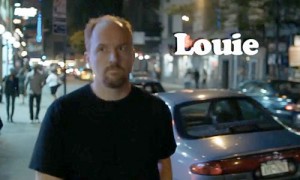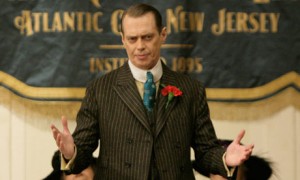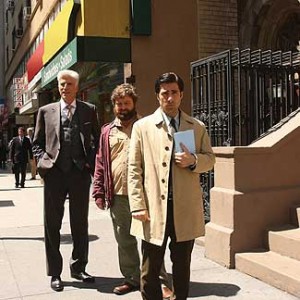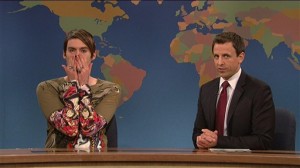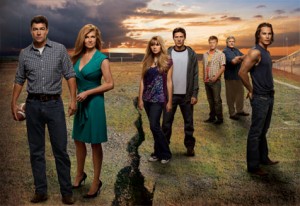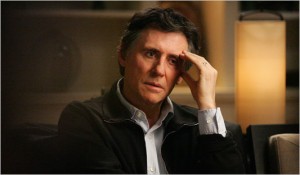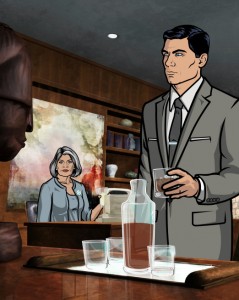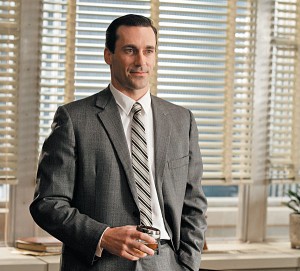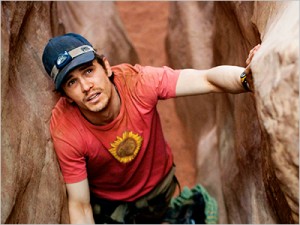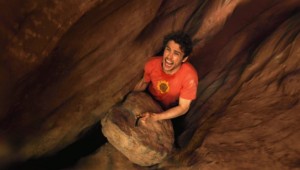I saw Roman Polanski’s The Ghost Writer on an airplane a few months after it came out. As soon as it came out on DVD, I knew I had to watch it again, to get a better feel for the complexities of this tightly-wound thriller. It held up and it continues to hold up as one of the better films released this year. So when I had the opportunity to talk to Pierce Brosnan and Olivia Williams about their experience making the film and working with a master filmmaker like Polanski, I jumped at it.
Williams is a woman that every geek fell in love with in Rushmore and has done solid work ever since, while Brosnan has made some fascinating choices since hanging up the James Bond tuxedo nearly a decade ago. They filled me in on working with Polanski, working with each other, and gave me some info about their upcoming films.
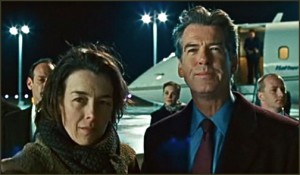
Olivia Williams: Sorry, I’m not very good at these three-way things.
Noah Forrest: Yeah, I feel like the ringleader of a strange carnival. But I wanted to start by saying that I liked The Ghost Writer a lot and I wanted to congratulate you on that.
Pierce Brosnan: Thank you.
Olivia Williams: Thanks.
Noah Forrest: I wanted to ask both of you whether you came to this film because of the material or for the chance to work with a director like Roman Polanski? And I guess we’ll ask Olivia first.
Olivia Williams: Oh, that feels all wrong.
Pierce Brosnan: It’s exactly right, Olivia.
Olivia Williams: Well, it would have to be a combination. I would have worked with Roman in pretty well anything, but I was very, very lucky that it was this character. And I completely responded to her immediately. Not least, without giving too much away, but I had Roman Polanski working very hard on my own denouement. So I feel consider myself very lucky and privileged to have worked with him and got to play this.
Pierce Brosnan: You had Roman working on your what, Olivia?
Olivia Williams: My own dénouement. Maybe that’s arrogance to call it that, but it felt like that.
Pierce Brosnan: Oh no, not at all. [Pause] For me, it was definitely working with Roman. He’s such an iconic figure on the landscape, so when I got the call – when I was in London – to go have lunch with him, I hopped on the train and had a most delightful three hour lunch with this great man. And luckily I had a wonderful part to play as well.
Noah Forrest: And did you and Olivia know each other before filming began or was this the first time you had met?
Pierce Brosnan: It was the first time we met.
Olivia Williams: We have some mutual friends, so I had heard he was delightful, but that can always be a lie in Hollywood.
Pierce Brosnan: We were on that wonderful island, Sylt, and I got a call and knew she was coming in the afternoon and I got a call from her saying, “Let’s have dinner. I’d like to have dinner and talk.” So we hit the ground running.
Olivia Williams: I felt that we should at least have dinner, considering we were supposed to have been married for twenty-five years. [Laughs]
Noah Forrest: It’s the least you could do, I guess… [Laughs]
Olivia Williams: I’m not much of a method actor, but I felt that was a good place to get started.
Noah Forrest: It’s interesting because you are playing husband and wife, but you don’t share much screen time with one another. So is it difficult to come up with an idea of who your spouse is or what your marriage is if you don’t get to develop that on screen? Or do you have to develop that off screen?
Olivia Williams: I’m not being facetious when I say that the dinner was actually very useful for that, to have a sort of genial time before we started sniping at each other. A lot of it, for me, was set up because I pestered poor Robert Harris with e-mails and he wrote this wonderful paragraph of things to heed of, that I have to love my husband though it seems in many ways that I’m using him.
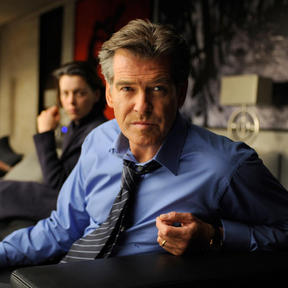
Noah Forrest: Well, I think that’s a tough kind of line you both have to balance – giving hints away without giving everything away. And I guess you have to rely on the other actors to do the same. So was the difficult for you to know what your character is, without letting the audience know immediately.
Pierce Brosnan: Well, not in my case, I don’t think. I feel that he’s a man about to burst, his brain’s open (and he finally gets his brains blown out) because he knows that he’s in a damaged relationship and its been like this for some time. The wolves are at the door for him and the long knives are out and he’s hanging by a thread, he’s a very pathetic character. When he sits on the sofa and he feebly asks, “What would you do?” It’s the ultimate humiliation. He succumbs to that. Olivia is so strong in her work, she cuts like a knife with her performance…it made me feel great in my own sick way about this character.
Olivia Williams: Having two really tough women fighting over him, having two lionesses protecting him, and the moment when – I think we’re talking about the same scene on the sofa – essentially Ruth says, I bow out, take him with you. Drama film is about people at the extreme of their lives and you meet all these people when they’re already up against it. You’re introduced to Ruth, she’s screaming and slamming the door…she’s already behaving just about as badly as any of us ever will. And then it cranks up. That’s what Roman does – he just keeps on cranking you up and cranking you up. And that was such a pleasure to act.
And, as you say, playing one thing and doing another. There’s a trend in scripts of people saying what they feel all the time and that’s not as much fun as an actor, it’s much more fun to say one thing and do something else.
Noah Forrest: Well, it’s much more true to life that way, I think. Often, we’re not saying what we feel. But Pierce, you bring up that scene which is so wonderful because it exposes what is supposed to be one of the great leaders of the world and he’s really just a sad man at the end of the day. I think the message there is very subtle, yet direct and I really admired that about the film. Were you wary of being Tony Blair? Because there were so many allusions – namely, being the former Prime Minister. I was wondering if that was something you were fearful of?
Pierce Brosnan: No, I wasn’t fearful of that. Roman sort of released me from that on our first lunch. I said, “Am I playing Tony Blair? Because it’s already been done brilliantly by Michael Sheen.” He said, “No, you’re not playing Tony Blair.” Which made absolutely sense because whatever I did it would turn out to be Tony Blair anyway. All roads lead to Tony Blair. Robert Harris is a good friend of his as well.
I did look at Tony Blair’s work as Prime Minister, I watched his speeches. But I didn’t try to indicate or play this fellow.
Olivia Williams: You got the grin, Pierce.
Pierce Brosnan: I got the grin, I got the grin. I used it once.
Olivia Williams: And the sadness killed me. I think you’re talking about the moment, Noah, that I loved when the Ghost says, “It looks like Rycart Publishing set all this up.” And Pierce says, “Can you ask them to stop?” Because there was such sadness and powerlessness in that moment.
Noah Forrest: The thing is, I don’t think you’re playing Tony Blair. I just asked that because I think you sidestep a lot of traps that one could fall in. And I think it was well-done that you managed to create this character that was uniquely its own.
Pierce Brosnan: Well, he’s an actor. He’s a born actor. You take the emblems of the script. He’s really this fellow with Peter Pan syndrome. He plays at being the Prime Minister, he’s a puppet.
Olivia Williams: That’s a brilliant phrase, actually, “the emblems of a script.” There were some things about the Blairs that were very important to honor to make the script work. And one of them was what Pierce was saying, the fact that he was the charismatic one, the one that people immediately responded to and loved of the two.
Noah: It’s almost an interesting feminist take on it because this really takes that saying of “Behind every great man is a woman” to its logical extreme. But I wanted to ask both of you – I mean, Roman Polanski is one of my favorite directors and he’s kind of renowned for being a controlling filmmaker. Did you find that to be so?
Pierce Brosnan: I had a baptism by fire with the fellow. My first day’s work was really my last scene with the character – it was on the airplane, on the jet. I walked straight into this vortex of Polanski and after that day’s work, he left me alone. I could see him get twitchy and I could feel his energy and I think we were all on our game because you just don’t want to get found out by Roman. You don’t want to have this guy coming up to you saying, [in Polish accent] “Why do you do it like this? Why? Why?” [Laughs]
Olivia Williams: Well, the point is that he’s worthy of being one of your favorites because there’s nothing accidental on that set. Nothing has happened by accident. It’s happened because Roman has seen it in his head and he wants it to be there. And therefore he really deserves the title of a great director or a great auteur. It is a terrifying experience to work with, but we were all in. As Ewan [McGregor] used always said, “You can argue with him, but he’s right, you do it his way and the whole machine works.” If you rebel, the machine doesn’t work. For him, filmmaking is very painful. The man is in quite a lot of pain most of the time, it feels like.
Pierce Brosnan: Especially when he can’t get the right lens. [Laughs]
Olivia Williams: And when it’s not right, he actually said to us that he closes his eyes and sees in his head this model vision. And he’s trying to force everyone and every object there to recreate that vision. I would be really upset if what I’m saying makes him sound like a difficult person to work with because that doesn’t come into it. There is a vision and we must all try to make it happen and then you, the viewing audience, will see what this man has created in his head.
Pierce Brosnan: You get a lot more from his camera, from the positioning. As you work on a scene, he will really take time to find the best dramatic angle. In relation to what is Olivia is saying, he really takes the time. That day when we were on the airplane, I was ready to go and Ewan was ready to go, it’s a six or seven page scene. But he spent the morning, as we sat there, just finding the angle. He worked backwards and forwards, backwards and forward. You could feel him generating this energy and you’re thinking, “Well Christ, I’m here, Ewan’s across from me, just put the camera here and shoot it.” But, he didn’t. He spent the morning looking at the guns, looking at the laptops, dealing with the props…
Olivia Williams: He never quite recovered from the disappointment of never finding the right slippers for under the bed.
Pierce Brosnan: Oh really? [Laughs]
Olivia Williams: And he was angry to the end of shooting and beyond that these slippers weren’t disgusting enough to be an old man’s abandoned slippers. And Ewan said that he brought him hundreds of wheelie suitcases that the Ghost carries with him in every scene, that wheelie suitcase had to be right. That matters to him as much as an actor, almost. Would you agree?
Pierce Brosnan: I would whole-heartedly agree. He gets involved in every detail, the squib, the blood going off in my head, the bullet wound…But it was an exhilarating experience to work with him and I would go out again, in a heartbeat, to work with him.
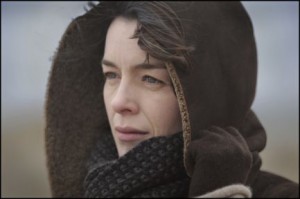
Noah Forrest: Does this aspect of his, where he’s very demanding and exacting, does that carry over to your performance as well? Like he does he do line-readings?
Pierce Brosnan: Yes.
Noah Forrest: Oh really?
Olivia Williams: I would call it a demonstration.
Pierce Brosnan: A demonstration. My line, I remember, “Give my ghost a Calvados,” I mean he had so many variations on that. I tried. I said, “I’ll try my best,” but it always sounded like I had a Polish accent, so it didn’t work.
Olivia Williams: It’s interesting because you’d resent it if he wasn’t right. I made some objections and wanted to change some stuff in the dinner scene and he said, “No, I’ve eaten this meal.” The food was designed around the scene. What we ate, the way it looked, how long it took to chew it. And so, to go in and say, “My character wouldn’t say that,” actually insults the amount of work and preparation that went into it.
Pierce Brosnan: Did he really say that about the food?
Olivia Williams: He really did, he absolutely did. He literally said we timed the scene. I wanted to make a line shorter and he said, no, I timed it.
Noah Forrest: Wow.
Olivia Williams: But he said that he and Robert had actually made the meal and had eaten it when they were writing it.
Pierce Brosnan: Oh my.
Noah Forrest: That’s pretty exacting, yeah.
Olivia Williams: I was kicking against it and I was trying to bring something of myself to the playing of the character, but after he explained his process, I backed off. “Let me do anything I can to recreate your vision.” And that was the pleasure of it. The pleasure wasn’t to kick against it, but to give yourself entirely over to his process because that’s when you “get it” with him, I believe.
Noah Forrest: I suppose there’s a certain school of directors who believe that acting is an act of submission. That’s gotta be so difficult for an actor to get to that point, where they’re willing to trust the director.
Olivia Williams: Well the fact that he has such a track record and he’s not 24 is working in his favor. I think if most 24 year olds tried to do that with their actors, they’d get kicked in the teeth. But I think there’s too much of a fashion possibly with directors who are saying, “That was great, do you think maybe possibly you might mind trying it this way…” And I think if you’re going to have directorial greatness, you need to be…You know, Wes Anderson who I worked with, he’s also exacting but in a different way.
Noah Forrest: Well, I was going to ask you about Wes Anderson because Rushmore was the first film that I saw you in. I think I was 15 or 16 when it came out and I was so totally blown away by it and I was going to ask you if they had a similar process because he seems very precise as well.
Olivia Williams: They couldn’t be more different as people, but there is definitely a comparison to be made in how exacting they are and how clear their vision is. I worked with Wes when he was very young and starting out and I think it’s interesting that he had such a pleasure with puppets on Fantastic Mr. Fox because he can really make them do exactly what he wants. [Laughs] And that is said with love.
Noah Forrest: And Pierce, I’ve been following your career for a long long time. I remember seeing The Lawnmower Man when was I was very young and being like, “That guy is gonna be a star!” But I think it’s interesting the direction your career has taken because it seems like you’ve built up this image and you’ve spent the past decade kind of slyly subverting it with movies like The Matador or The Tailor of Panama. And even now with The Ghost Writer. I was wondering if that’s a conscious decision on your part of if these just happened to be the roles you found most attractive?
Pierce Brosnan: It’s 50-50 really. You set your intentions to do something, like I did when I came here in 1981, which was to be as successful as I possibly could be in movies. Well, I got a TV series. Beggars can’t be choosers, so I ran with that for all it was worth. And of course, doing Remington Steele, I created this image for myself that ultimately led to James Bond. So, you find yourself painted into a corner, so you have to find your way out and find parts that will lend themselves to your own creativity and potential. So yes, there’s certainly a conscious effort to re-mold, re-define, change. I believe I can play more than one character, so hopefully one can play more than one note. So that’s the task at hand, always has been. You know, I’ve managed to stay employed throughout this career. I’m really a working actor and I’m always happy to go to work. I don’t like trying to toil over the next direction of where I should go. Sometimes I’ve just had to work to feed my family. It hasn’t always been the work I want, but I’m working and that’s the greatest joy for any actor: to work. And you have to have patience. So it’s nice to make twists, to make sharp left turns. The Matador was certainly a wonderful experience and one that I wouldn’t have had if I didn’t make it myself, because you get pigeonholed. People don’t take risks, so that’s why having one’s own company or having a partner as I do in Beaumarie St. Clair at Irish DreamTime, it’s been the most exhilarating and exciting work for me.
Noah Forrest: And both of you have exciting movies on the horizon. Pierce, you have Salvation Boulevard coming out next year. And Olivia, you’ve got Hanna, which is Joe Wright’s next film. So is there anything either of you can share with us about those films?
Pierce Brosnan: We went back out to the desert there a month or so ago to put an added scene on it, which I hear works like gangbusters and that’s as much as I know. I haven’t spoken to anyone about it. George Ratliff is directing from a book with the same title; Ed Harris, Greg Kinnear and myself. Just wasn’t enough of Greg. We kicked the movie off and then it goes off in different directions. I had a great time doing it. It was wonderful to be with Greg again.
Noah Forrest: Well you and Greg Kinnear had great chemistry in The Matador. And Olivia, what can you tell us about Hanna?
Olivia Williams: It was interesting movie from Polanski to Wright. He’s another director with an extraordinary vision. It feels like it’s happening much more on the set, his vision and gift. This film is so many things. The script just jumped out, I loved the script. It’s part assassin thriller, it’s part road movie. I’m in the road movie section of it, so I was driving a huge hippie truck around Morocco with Jason Flemyng and Saoirse Ronan. She’s astonishing. I have quite a small part in it, but I was like, come on, this kid is gonna be trouble. She was so phenomenal in Atonement and she was only 12, now she’s gonna be 16 and a pain in the ass. [Laughs] She’s absolutely delightful, humble, beautiful. When she turned those blue eyes on me, I was like, “Okay, you’re gonna be a huge star.” And Cate Blanchett, you just can’t argue with her…you really can’t argue with her, it’s very difficult. [Laughs] I haven’t seen it, but I can’t wait.
Noah Forrest: Well, I’m gonna get you guys out of here on this question, which is what I ask everyone before they leave: what is your favorite film of all-time?
Olivia Williams: Pierce, you go first, give me time to think!
Pierce Brosnan: [Rushing] Uh, um, There Will Be Blood!
Noah Forrest: That’s a good one!
Olivia Williams: The Man Who Would Be King.
Noah Forrest: That’s another great one. Two wonderful choices. Well thanks to the both of you. I really appreciate this.
Olivia: Thank you.
Pierce Brosnan: Okay, I’ll see you later tonight Olivia. Noah, goodbye!





